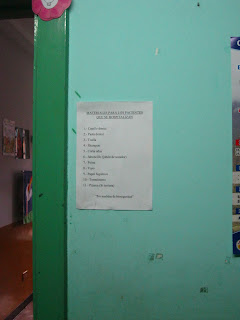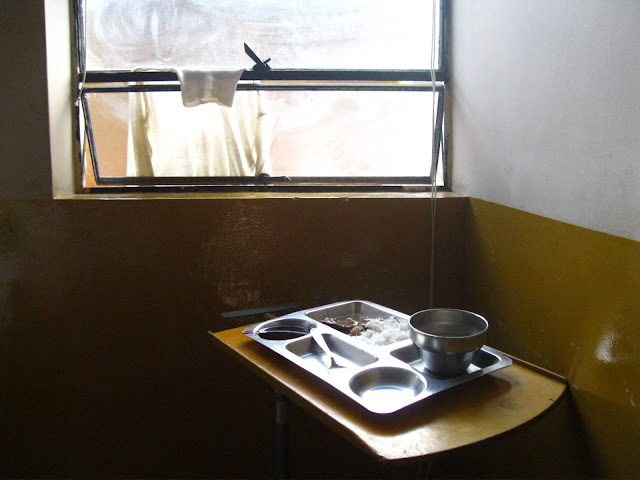 |
| Basic nursing station |
This project is big in advocating for these patients who have little and might otherwise try to 'escape' the hospital before they have been properly treated, knowing that they won't be able to pay the bill when it comes at the end of their stay (I hear that has happened often). When they can, they help supply basic medical supplies, such as for patients on the Burns Unit who are required to buy specific, but very expensive, antibacterial supplies. They also help discreetly educate families who may not have a basic understanding of preventative care, such as, occasionally turning a long-term patient to prevent bedsores, or teaching on basic hygiene and supplying mini hand soaps and antibacterial gels to prevent contamination of wounds. It must be done discreetly, because some of the staff can get their nose out of joint over us helping "too much".
Being hospitalised here, patients have to provide their own:
- medications (any prescriptions ordered by the Doctor)
- medical supplies (such as bandages or antibacterial sprays or creams) and
- other basic things needed (see photos below) for the endurance of their stay.
 |
| Patients must also supply their own shampoo, sleepwear, and thermometer |
Little is available for family members, and most from the country can't afford to stay somewhere in town, so they often sleep out in the field above the hospital. Temperatures in Cusco are often close to freezing overnight. There are no bathrooms available outside, and after visiting hours, they must use the field as well for this.
When laundry needs to be done, family members will wash by hand and hang clothes outside the windows on the one side of the hospital that receives the hot sun throughout the day.
 |
| Traction set-up on the beds in the Trauma Unit |
Rooms are often shared by patients of all ages (on the wards other than Pediatrics). There are no call-switches to alert nurses.
 |
| A basic patient bed |
 |
| One of the rooms on the pediatrics ward |
A couple of weeks ago, we put on a mini-birthday party for a 2-year old on the Burns ward, complete with cake, cookies, hot chocolate (cooled down!), and watermelon. We dressed up in clown outfits and made balloon animals (I've only learned how to do a dog and a giraffe), and later took the extra food to the children on the other wards along with balloons and mini bible-story booklets for them to keep.
Although it can be a really difficult place to step into, it's worth seeing the smiles on some of the faces of not only the children, but their grateful parents, as well.




